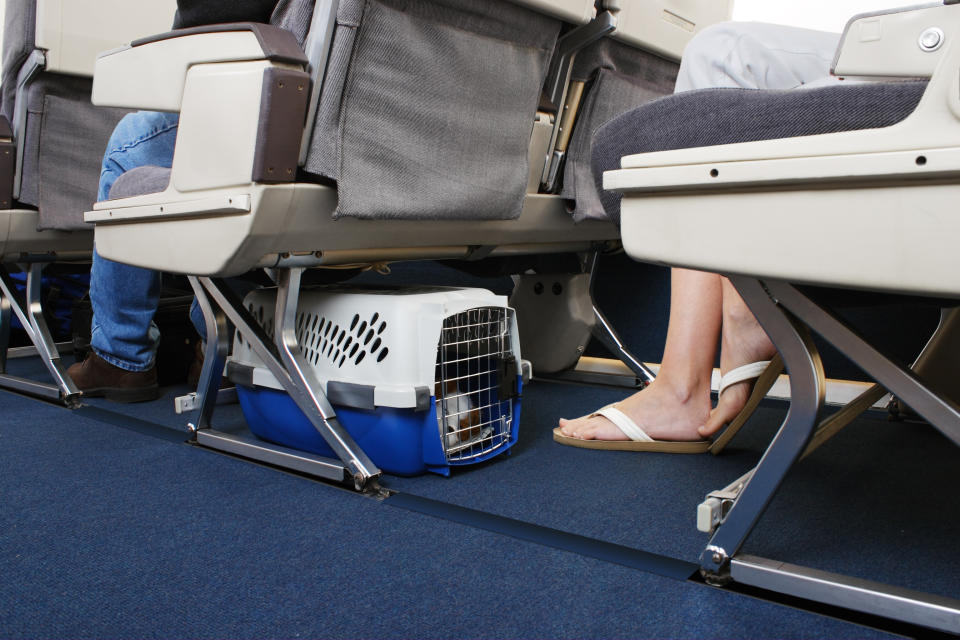‘The system is clearly abused’: Why 2018 was a terrible year for emotional support pets on planes

It’s been a tough year for emotional support animals. Several have made headlines due to incidents with airlines and, in response, many airlines have tightened their restrictions on these animals.
The latest: Delta announced in a press release on Monday that it will be imposing stricter regulations on emotional support animals on its flights. Specifically, emotional support animals will not be allowed on flights longer than eight hours. Age also matters. Emotional support animals and trained service animals will not be allowed on flights if they are under 4 months old.
This comes less than a year after Delta announced that it would tighten its regulations on emotional support animals in response to an 84 percent increase in incidents with the animals since 2016. The airline specifically called out animals peeing and pooping on flights and biting passengers or crew.
United Airlines also changed its emotional support animal policy after an emotional support peacock was denied access to a flight. United now requires “additional documentation,” including a veterinary health form that shows the animal has been properly vaccinated and has been trained to “behave properly in a public setting. With prior documentation and clearance, a customer may travel with no more than one emotional support animal, which cannot weigh more than 65 pounds,” the new regulations say.
But the law hasn’t changed. The Department of Transportation says that “airlines cannot refuse to allow your animal onboard because it makes other passengers or flight crew uncomfortable.” However, it also notes that “your animal must behave properly” and that “an animal that engages in disruptive behavior (e.g. barking or snarling, running around, and/or jumping onto other passengers, etc. without being provoked) will not be accepted as a service animal.” The department also states that for flights longer than eight hours, airlines “may require” documentation that an animal will not need to relieve itself or “can do so in a sanitary way.”
In order to fly with an emotional support animal, a person must have a letter from a licensed therapist or doctor that says that the animal is needed, the Air Carrier Access Act says. But the act also says that “unusual” animals may be evaluated by the airline on a case-by-case basis. Airlines can also refuse those animals that are too large or heavy to fit on an airplane or can cause a disruption.
Although some people rely on the help of emotional support animals, “the system is clearly abused,” Marc Bekoff, an animal behaviorist and professor emeritus at the University of Colorado, tells Yahoo Lifestyle. “People are buying vests online indicating a dog is an emotional support animal or other sort of support animal when they’re not,” he says. “That’s really egregious. But airlines are getting stricter about their policies because of the abuse.”
But this is putting people who actually need these animals at a disadvantage, licensed clinical psychologist John Mayer, author of Family Fit: Find Your Balance in Life, tells Yahoo Lifestyle. “Emotional support animals, when used appropriately, can be like a 24-hour therapist,” he says. “They provide supportive therapy to those in need, much like the comforting a therapist can give with supportive therapy.” Still, he acknowledges that exploitation of this is common. “Many health care providers do this as a favor to patients, relatives and friends rather than thinking of the larger social implications of giving these permissions,” says Mayer.
Still, “we’re probably not talking about a large percentage of people,” Gail Saltz, MD, a psychiatrist and author of The Power of Different, tells Yahoo Lifestyle. “A therapy animal may make someone feel more comfortable in addressing their particular need, which is usually anxiety, but it may not be a deal-breaker for them. People can benefit from these animals but not necessarily be immobilized without them, particularly if they’re receiving other forms of treatment, which is important.” Airlines also have to balance the needs of people with emotional support animals against the needs of other passengers who may have their own anxieties about flying or animals, Saltz says.
In choosing an emotional support animal, Bekoff recommends that people keep in mind that they should opt for one that will be OK in most social situations. “You have to be reasonable about where these animals are allowed to go,” he says. “Choosing a peacock or a goat … you cannot reasonably think you’re going to be able to go certain places with them.”
Read more from Yahoo Lifestyle:
The internet is living for this dog’s spiky, neon-pink outfit to ward off coyotes
7 tips to help you travel safely with your dog or cat this holiday season
Follow us on Instagram, Facebook and Twitter for nonstop inspiration delivered fresh to your feed, every day.

